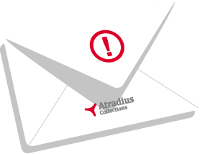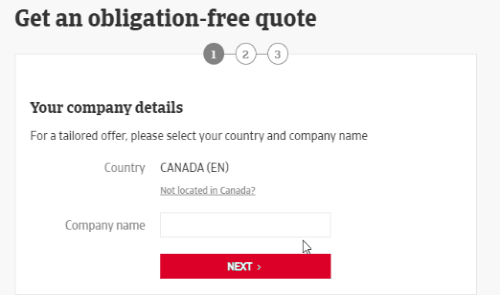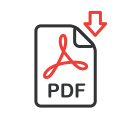Making sales is crucial, but receiving money from sales is just as crucial.When an invoice remains unpaid after its due date, it's natural that you should collect it. |

|
Avoiding confronting your customers with their non-payment seems like it keeps your business relationships going. However, accumulated bad debts can harm your cash flow to the point that you can't afford to keep your own business going.
In reality, collections doesn't need to be offensive or aggressive. You can collect outstanding invoices while maintaining your business relationships.
The key is to perform the right collections activity at the right time.
Below are four means of collections widely used by most businesses.
1. E-mails |

|
Pros
- Cost-effective, time-saving. Obviously, you don't incur extra costs in sending reminder emails. You can send reminder emails to multiple late payers at the same time. It's also quick for them to reply to you.
- Convenient. Emails can work as independent reminders or as follow-up notes to phone calls and meetings. You can email your customers as soon as the invoices become past due without being perceived to be pushy. You can attach relevant documents, such as statements of account or copies of the outstanding invoices to the emails. Even when your emails reach the wrong persons, they can simply be forwarded to the right recipients. At any point during the collections process, you can refer back to previous emails to keep tabs on what your customers said or promised. That's why you should write down and email your customers the details of each phone call and meeting.
- High feasibility. Your customers should receive your emails shortly after you send them, unless their Internet access is limited or their firewalls or spam filters block your emails. If your customers remain unresponsive to your emails, you can call them to check whether they've received the emails.
Cons
- Low-impact. If misunderstandings or disputes arise between you and your customers, it's best to clarify and resolve them by calling instead of continuing emailing.
2. Letters |

|
Pros
- High-impact. Sending letters is a good next step when your customers don't respond to your reminder emails. Implying official and formal procedures, letters add considerable weight to your collections and signal that you're serious about recovering the debts. You can send several dunning letters before sending a final demand letter, which warns your customers of your escalation of collections if they still don't pay. All letters can also be written and sent by a collections agency on your behalf to ensure professional language and high efficiency.
Cons
- High-cost, time-consuming, inconvenient. If you have many late payers in various countries and you write and send the letters yourself, you could spend lots of time and money on printing and posting the letters.
- Low feasibility. If your customers moved away without de-registering at the old places or registering at the new places, you could be at a loss to find their addresses.
3. Phone calls |

|
Pros
- High-impact. Phone calls are effective in talking late payers into settling their invoices. Talking directly to them makes it easier to get to the heart of any payment issues. It's also more difficult for your customers to use stalling tactics or shrug off their obligation to pay. However, it's hard to enforce verbal agreements because your customers can deny entering into them. That's why it's important to take note of each call and email the notes, including agreements and next steps, to your customers. The notes keep both parties on the same page and can be served as proof of what your customers promised.
- Convenient, high-feasibility. Once you pick up the phone, you're likely to reach your late payers directly. This makes phone calls an ideal means to collect when your customers remain inactive or disregard your previous collections attempts.
Cons
- High-cost, time-consuming. In many cases, you need to go through several people to get to the right persons. You also need to call multiple times because they aren't always available the first time you call or they screen your calls. When you have them on the line, you could be persuaded by their excuses or distracted by their small talk if you aren't well prepared. Then you would hang up empty-handed, not knowing what the next step is or when the customers will pay. Or, even worse, you could be overwhelmed by their aggression and would have to hang up to damp the heat of the discussion down. You often need to practise these scenarios and call your customers again when you're more prepared.
4. Face-to-face meetings |

|
Pros
- High-impact. If your late payers don't respond to any of your emails, letters, phone calls, or if you can't resolve their disputes over the phone, arranging face-to-face meetings is usually your next best step. It can be at your office, their office, or a neutral location. Your presence makes it much harder for your customers to make excuses. It also puts pressure on them to fulfil any commitments they're going to make. If you visit your customers onsite, you can also observe their operations. There can be telltale signs of underlying problems that your customers didn't address with you. Similar to phone calls, you need to write down all verbal agreements reached during your visits for future reference.
Cons
- High-cost, time-consuming, inconvenient. This is one of the most demanding means of collections. You may only want to use face-to-face meetings to collect the most serious and largest debts.
- Low feasibility. Even when you'd like to, you may not be able to meet your customers because they aren't available, they don't want to meet, or circumstances don't allow travelling.
To know which means of collections you should use, you need to consider your late payers' types, their payment history, plus many other factors.
Sending the same emails or letters to all late payers, for example, won't increase your chance of collections. If it's too time-consuming to collect your outstanding invoices or your efforts haven't resulted in payment, consider getting external help.
Quick payments are important, but quick collections are just as important.
Collections experts can help you use the right collections means, taking into account the circumstances of your late payers. In this manner, your customers can see that you're working with, not against, them to keep both parties in business. So there's a good chance you will not only receive payments but also maintain your business relationships.
An experienced and professional collections agency with the right approaches can encourage your customers to pay, while maintaining your business relationships.
With Atradius Collections, you can use the online service to:
- Know right away how much it costs to collect your outstanding invoices. Get a free quote here.
- See real-time updates on the collections progress
- Get paid as soon as your customers pay their outstanding invoices

